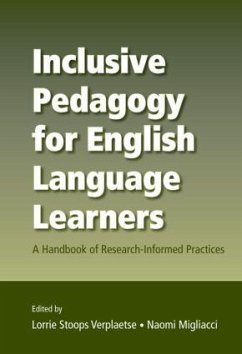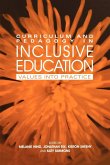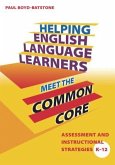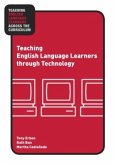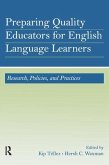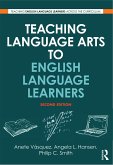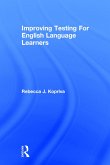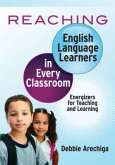Naomi Migliacci / Lorrie S. Verplaetse (eds.)A Handbook of Research-Informed Practices
Inclusive Pedagogy for English Language Learners
A Handbook of Research-Informed Practices
Herausgeber: Verplaetse, Lorrie Stoops; Migliacci, Naomi
Naomi Migliacci / Lorrie S. Verplaetse (eds.)A Handbook of Research-Informed Practices
Inclusive Pedagogy for English Language Learners
A Handbook of Research-Informed Practices
Herausgeber: Verplaetse, Lorrie Stoops; Migliacci, Naomi
- Broschiertes Buch
- Merkliste
- Auf die Merkliste
- Bewerten Bewerten
- Teilen
- Produkt teilen
- Produkterinnerung
- Produkterinnerung
In this Handbook leading researchers, teacher educators, and expert practitioners speak to current and future educators and educational leaders in understandable language about the research that informs best practices for English language learners integrated into the K-12 public school system.
Andere Kunden interessierten sich auch für
![Curriculum and Pedagogy in Inclusive Education Curriculum and Pedagogy in Inclusive Education]() Kieron Sheehy / Melanie Nind / Jonathan Rix / Katy Simmons (eds.)Curriculum and Pedagogy in Inclusive Education64,99 €
Kieron Sheehy / Melanie Nind / Jonathan Rix / Katy Simmons (eds.)Curriculum and Pedagogy in Inclusive Education64,99 €![Helping English Language Learners Meet the Common Core Helping English Language Learners Meet the Common Core]() Paul Boyd-BatstoneHelping English Language Learners Meet the Common Core35,99 €
Paul Boyd-BatstoneHelping English Language Learners Meet the Common Core35,99 €![Teaching English Language Learners through Technology Teaching English Language Learners through Technology]() Tony ErbenTeaching English Language Learners through Technology57,99 €
Tony ErbenTeaching English Language Learners through Technology57,99 €![Preparing Quality Educators for English Language Learners Preparing Quality Educators for English Language Learners]() Preparing Quality Educators for English Language Learners54,99 €
Preparing Quality Educators for English Language Learners54,99 €![Teaching Language Arts to English Language Learners Teaching Language Arts to English Language Learners]() Anete VásquezTeaching Language Arts to English Language Learners67,99 €
Anete VásquezTeaching Language Arts to English Language Learners67,99 €![Improving Testing For English Language Learners Improving Testing For English Language Learners]() Rebecca KoprivaImproving Testing For English Language Learners73,99 €
Rebecca KoprivaImproving Testing For English Language Learners73,99 €![Reaching English Language Learners in Every Classroom Reaching English Language Learners in Every Classroom]() Debbie ArechigaReaching English Language Learners in Every Classroom35,99 €
Debbie ArechigaReaching English Language Learners in Every Classroom35,99 €-
-
-
In this Handbook leading researchers, teacher educators, and expert practitioners speak to current and future educators and educational leaders in understandable language about the research that informs best practices for English language learners integrated into the K-12 public school system.
Produktdetails
- Produktdetails
- Verlag: Routledge
- Seitenzahl: 380
- Erscheinungstermin: 19. September 2007
- Englisch
- Abmessung: 254mm x 178mm x 20mm
- Gewicht: 713g
- ISBN-13: 9780805857207
- ISBN-10: 0805857206
- Artikelnr.: 22519267
- Herstellerkennzeichnung
- Libri GmbH
- Europaallee 1
- 36244 Bad Hersfeld
- gpsr@libri.de
- Verlag: Routledge
- Seitenzahl: 380
- Erscheinungstermin: 19. September 2007
- Englisch
- Abmessung: 254mm x 178mm x 20mm
- Gewicht: 713g
- ISBN-13: 9780805857207
- ISBN-10: 0805857206
- Artikelnr.: 22519267
- Herstellerkennzeichnung
- Libri GmbH
- Europaallee 1
- 36244 Bad Hersfeld
- gpsr@libri.de
Verplaetse, Lorrie Stoops; Migliacci, Naomi
Contents: Preface. L.S. Verplaetse
N. Migliacci
Inclusive Pedagogy: An Introduction. Part I:In the Elementary Classroom. Editors' Introduction. M.E. Brisk
D.A. Horan
E. MacDonald
A Scaffolded Approach to Learning to Write. J. Willett
R. Harman
A. Hogan
M.E. Lozano
J. Rubeck
Transforming Standard Practices to Serve the Social and Academic Learning of English Language Learners. J. Yedlin
Pedagogical Thinking and Teacher Talk in a First Grade ELL Classroom. R.C. Parker
Integrating Test Tasks Into Everyday Classroom Activities: A Coach's Report on Collaborative Action Research Teams. Part II: In the Secondary Classroom. Editors' Introduction. A. Walqui
The Development of Teacher Expertise to Work With Adolescent English Learners: A Model and a Few Priorities. L.S. Verplaetse
N. Migliacci
Making Mainstream Content Comprehensible Through Sheltered Instruction. L.S. Verplaetse
Developing Academic Language Through an Abundance of Interaction. L. Harklau
Through and Beyond High School: Academic Challenges and Opportunities for College-Bound Immigrant Youth. Part III:School and Community Organization. Editors' Introduction. A. Colón
Community Based Organizations: Partnerships for Student Success. N. Migliacci
High School and University Partnerships: The Strengths and Challenges for ELLs. D. Wei
Activist Organization and Parental Engagement in Philadelphia's Chinatown. Part IV:District and School Reform. Editors' Introduction. M. Coady
E.T. Hamann
M. Harrington
M. Pacheco
S. Pho
J. Yedlin
Successful Schooling for ELLs: Principles for Building Responsive Learning Environments. T.Z. Miranda
Bilingual Education for All Students: Still Standing After All These Years! G.P. De George
Is It Language or Is It Special Needs? Appropriately Diagnosing English Language Learners Having Achievement Difficulties. E.T. Hamann
Meeting the Needs of ELLs: Acknowledging theSchism Between ESL/Bilingual and "Mainstream" Teachers and Illustrating That Problem's Remedy. N. Migliacci
L.S. Verplaetse
Inclusive Pedagogy in a Mandate-Driven Climate.
N. Migliacci
Inclusive Pedagogy: An Introduction. Part I:In the Elementary Classroom. Editors' Introduction. M.E. Brisk
D.A. Horan
E. MacDonald
A Scaffolded Approach to Learning to Write. J. Willett
R. Harman
A. Hogan
M.E. Lozano
J. Rubeck
Transforming Standard Practices to Serve the Social and Academic Learning of English Language Learners. J. Yedlin
Pedagogical Thinking and Teacher Talk in a First Grade ELL Classroom. R.C. Parker
Integrating Test Tasks Into Everyday Classroom Activities: A Coach's Report on Collaborative Action Research Teams. Part II: In the Secondary Classroom. Editors' Introduction. A. Walqui
The Development of Teacher Expertise to Work With Adolescent English Learners: A Model and a Few Priorities. L.S. Verplaetse
N. Migliacci
Making Mainstream Content Comprehensible Through Sheltered Instruction. L.S. Verplaetse
Developing Academic Language Through an Abundance of Interaction. L. Harklau
Through and Beyond High School: Academic Challenges and Opportunities for College-Bound Immigrant Youth. Part III:School and Community Organization. Editors' Introduction. A. Colón
Community Based Organizations: Partnerships for Student Success. N. Migliacci
High School and University Partnerships: The Strengths and Challenges for ELLs. D. Wei
Activist Organization and Parental Engagement in Philadelphia's Chinatown. Part IV:District and School Reform. Editors' Introduction. M. Coady
E.T. Hamann
M. Harrington
M. Pacheco
S. Pho
J. Yedlin
Successful Schooling for ELLs: Principles for Building Responsive Learning Environments. T.Z. Miranda
Bilingual Education for All Students: Still Standing After All These Years! G.P. De George
Is It Language or Is It Special Needs? Appropriately Diagnosing English Language Learners Having Achievement Difficulties. E.T. Hamann
Meeting the Needs of ELLs: Acknowledging theSchism Between ESL/Bilingual and "Mainstream" Teachers and Illustrating That Problem's Remedy. N. Migliacci
L.S. Verplaetse
Inclusive Pedagogy in a Mandate-Driven Climate.
Contents: Preface. L.S. Verplaetse
N. Migliacci
Inclusive Pedagogy: An Introduction. Part I:In the Elementary Classroom. Editors' Introduction. M.E. Brisk
D.A. Horan
E. MacDonald
A Scaffolded Approach to Learning to Write. J. Willett
R. Harman
A. Hogan
M.E. Lozano
J. Rubeck
Transforming Standard Practices to Serve the Social and Academic Learning of English Language Learners. J. Yedlin
Pedagogical Thinking and Teacher Talk in a First Grade ELL Classroom. R.C. Parker
Integrating Test Tasks Into Everyday Classroom Activities: A Coach's Report on Collaborative Action Research Teams. Part II: In the Secondary Classroom. Editors' Introduction. A. Walqui
The Development of Teacher Expertise to Work With Adolescent English Learners: A Model and a Few Priorities. L.S. Verplaetse
N. Migliacci
Making Mainstream Content Comprehensible Through Sheltered Instruction. L.S. Verplaetse
Developing Academic Language Through an Abundance of Interaction. L. Harklau
Through and Beyond High School: Academic Challenges and Opportunities for College-Bound Immigrant Youth. Part III:School and Community Organization. Editors' Introduction. A. Colón
Community Based Organizations: Partnerships for Student Success. N. Migliacci
High School and University Partnerships: The Strengths and Challenges for ELLs. D. Wei
Activist Organization and Parental Engagement in Philadelphia's Chinatown. Part IV:District and School Reform. Editors' Introduction. M. Coady
E.T. Hamann
M. Harrington
M. Pacheco
S. Pho
J. Yedlin
Successful Schooling for ELLs: Principles for Building Responsive Learning Environments. T.Z. Miranda
Bilingual Education for All Students: Still Standing After All These Years! G.P. De George
Is It Language or Is It Special Needs? Appropriately Diagnosing English Language Learners Having Achievement Difficulties. E.T. Hamann
Meeting the Needs of ELLs: Acknowledging theSchism Between ESL/Bilingual and "Mainstream" Teachers and Illustrating That Problem's Remedy. N. Migliacci
L.S. Verplaetse
Inclusive Pedagogy in a Mandate-Driven Climate.
N. Migliacci
Inclusive Pedagogy: An Introduction. Part I:In the Elementary Classroom. Editors' Introduction. M.E. Brisk
D.A. Horan
E. MacDonald
A Scaffolded Approach to Learning to Write. J. Willett
R. Harman
A. Hogan
M.E. Lozano
J. Rubeck
Transforming Standard Practices to Serve the Social and Academic Learning of English Language Learners. J. Yedlin
Pedagogical Thinking and Teacher Talk in a First Grade ELL Classroom. R.C. Parker
Integrating Test Tasks Into Everyday Classroom Activities: A Coach's Report on Collaborative Action Research Teams. Part II: In the Secondary Classroom. Editors' Introduction. A. Walqui
The Development of Teacher Expertise to Work With Adolescent English Learners: A Model and a Few Priorities. L.S. Verplaetse
N. Migliacci
Making Mainstream Content Comprehensible Through Sheltered Instruction. L.S. Verplaetse
Developing Academic Language Through an Abundance of Interaction. L. Harklau
Through and Beyond High School: Academic Challenges and Opportunities for College-Bound Immigrant Youth. Part III:School and Community Organization. Editors' Introduction. A. Colón
Community Based Organizations: Partnerships for Student Success. N. Migliacci
High School and University Partnerships: The Strengths and Challenges for ELLs. D. Wei
Activist Organization and Parental Engagement in Philadelphia's Chinatown. Part IV:District and School Reform. Editors' Introduction. M. Coady
E.T. Hamann
M. Harrington
M. Pacheco
S. Pho
J. Yedlin
Successful Schooling for ELLs: Principles for Building Responsive Learning Environments. T.Z. Miranda
Bilingual Education for All Students: Still Standing After All These Years! G.P. De George
Is It Language or Is It Special Needs? Appropriately Diagnosing English Language Learners Having Achievement Difficulties. E.T. Hamann
Meeting the Needs of ELLs: Acknowledging theSchism Between ESL/Bilingual and "Mainstream" Teachers and Illustrating That Problem's Remedy. N. Migliacci
L.S. Verplaetse
Inclusive Pedagogy in a Mandate-Driven Climate.

